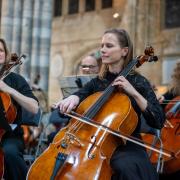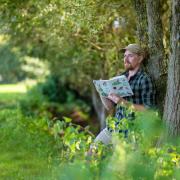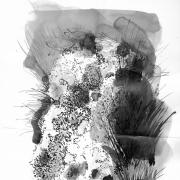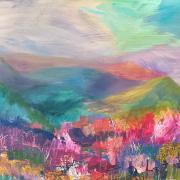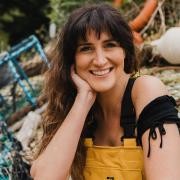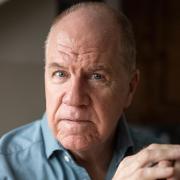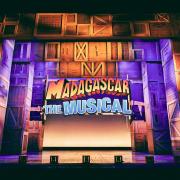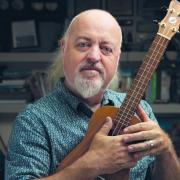Maggie Irving from Exmouth isn’t your stereotypical circus clown with a red nose and comedy footwear and she’s certainly nobody’s fool. With a PhD in the subject, she’s positively serious about teaching the art of clowning to the uninitiated, as Sharon Goble discovered.
The first time I went along to one of Maggie Irving’s courses, some years ago, she had me howling at the moon like a wolf. Talk about “howling with laughter” - I found it both hilarious and cathartic. So I was prepared for anything when I ventured along to one of her recent “clowning classes” in Exmouth. Just as well...
A class with Maggie is about seeing the world in a different way, embracing the ridiculous and letting go of your inhibitions in front of an audience. So she had me emerging from behind a screen, improvising a range of facial expressions and exaggerated movements to express my emotions about the best and worst bits of my body. If you don’t mind, I’ll keep the details close to my chest.
“Clowning seeps into your everyday life. It’s an art form that becomes part of who you are,” Maggie tells me. “You notice the detail, are mindful of yourself, pick up on body language. It’s a wonderful skill to have in real life, it helps you empathise with people and I love it.”
Clowning is also a way of getting back in touch with the playful qualities we naturally exhibit as young children, before we become conscious of the ‘rules of society’. Maggie says: “Until about the age of 11 most children play. Then they start trying to maintain a certain status and be part of the group. Clowns play but they don’t always obey the rules. As a clown, you are playing with whatever comes into your head at that moment.”
Maggie has always loved to communicate and entertain. She worked in public relations for BT before having a family, then went to the University of Plymouth as a mature student in 2002 to do an undergraduate degree in theatre and performance.
“The course included a module on clowning. I was good at it. It was very freeing. Clowns are outrageous - they have permission to play, experiment, be naughty. Initially, I watched other people teach clowning. By the time I taught it myself seven years later, it was noticeable that students were gradually becoming more inhibited. They were coming to my clown classes as 18-year-olds and I had to rip away all they had learned and take them back to when they used to be playful.”
Maggie’s final dissertation was on Female Clowns. Hooked, she went on to do a Masters then a PhD: “The Labour government funded my doctorate in Clown Studies - it’s hilarious!”
As far as Maggie’s aware, she’s the only academic who has researched clowning through practising it as a performer: “I like to teach people to pick out the nuanced moments and then they start to build on that. Eventually it becomes automatic but you first have to learn that skill.”
Some of the greatest clowns, she says, are non-circus performers like Charlie Chaplin who used their costuming and their behaviour as their mask instead of make-up and a red nose. Maggie clowns both with and without costumes. She created the character of “Sedusa” for her final PhD performance, complete with steel-capped boots and a fantastic wig of serpents made specially for her by a local artist.
As well as clowning, Maggie now also teaches stand-up: “Clown comedy is generally about making yourself the fool. It’s very physical and embraces the ridiculous. There’s never any failure as a clown, nothing’s right or wrong. With stand-up, it’s usually the audience in a position of lower status. It’s more verbal and typically makes fun of others.”
Her classes are for people from all walks of life: business people, students, seasoned performers and the naturally curious all learning, together, how to see and show the funny side of life. It makes for a stimulating mix and reminded me, for one, how much I enjoy the adrenalin-rush of being put on the spot in front of a live audience.
“Being a comedic performer makes you resilient,” says Maggie. “You have to ‘die on stage’ a few times to be good. Die laughing, that’s what I say!” w
“I remain just one thing, and one thing only, and that is a clown. It places me on a far higher plane than any politician.” Charlie Chaplin
“Dare to wear the foolish clown face.” Frank Sinatra
“It is no coincidence that the word “clown” originally meant a country-dweller or peasant, before becoming associated with stage buffoonery.... The bumpkin was a standard character in restoration drama.” John Morrish, writer and editor
“I believe in the vital role of clowns as truth tellers, entertainers, subversives and communicators in the arts, in society and across the world.” Angela de Castro, founder of Contemporary Clowning Projects
“I think of myself as an intelligent, sensitive human being with the soul of a clown which always forces me to blow it at the most important moments.” Jim Morrison






